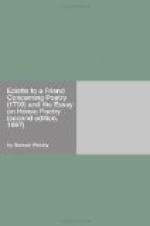To begin with Fable, which he makes included in the general Nature or Essence of Epic. This, he says, is the most essential Part of it; “That some Fables and Allegories scatter’d up and down in a Poem don’t suffice to constitute Epic, if they are only the Ornaments, and not the very Foundation of it.” And again, “That ’tis the very Fund and principal Action that ought to be Feign’d and Allegorical:” For which reason he expresly excludes hence all simple Histories, as by Name, Lucan’s Pharsalia, Silius Italicus’s Punic War, and all true Actions of particular Persons, without Fable: And still more home; that ’tis not a Relation of the Actions of any Hero, to form the Manners by his Example, but on the contrary, a Discourse invented to form the Manners by the Relation of some one feign’d Action, design’d to please, under the borrow’d Name of some illustrious Person, of whom Choice is made after we have fram’d the Plan of the Action which we design to attribute to him.
Nor indeed is Bossu singular in his Judgment on this Matter, there being few or none who have ever writ on the same Subject, but are of the same mind: For thus Boileau in his Art of Poetry,
Dans la vaste recit d’une longue
action
Se soutient par la Fable & vit de Fiction.
Which his Translator I think better;
In the Narration of some great Design,
Invention, Art, and Fable, all must join.
Rapin too gives his Vote on the same side, Rien n’est, says he, plus essentiel au Poem Epique, que la Fiction; and quotes Petronius to that purpose, Per ambages, Deorumque ministeria praecipitandus est Liber Spiritus. Nor is’t only the Moderns who are of this Opinion; for the Iliads are call’d in Horace, Fabula qua Paridis, &c. And lastly, even Aristotle himself tells us, “That Fable is the principal thing in an Heroic Poem; and, as it were, the very Soul of it.” [Greek: Arche kai oion psyche.] And upon this occasion commends Homer for lying with the best Grace of any Man in the World: Authorities almost too big to admit any Examination of their Reason, or Opposition to their Sentiments. However, I see no cause why Poetry should not be brought to the Test, as well as Divinity, or any more than the other, be believed on its own bare ipse dixit.
Let us therefore examine the Plan which they lay for a Work of this Nature, and then we may be better able to guess at those Grounds and Reasons on which they proceed.
In forming an Heroic-Poem, the first thing they tell us we ought to do, is to pitch on some Moral Truth, which we desire to enforce on our Reader, as the Foundation of the whole work. Thus Virgil, as Bossu observes, designing to render the Roman People pleased and easie under the new Government of Augustus, laid down this Maxim, as the Foundation of his Divine AEneis: “That great and notable Changes of State are not accomplished but by the Order and Will of God: That those who oppose themselves against them are




